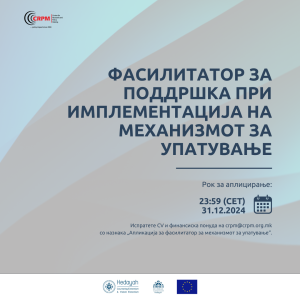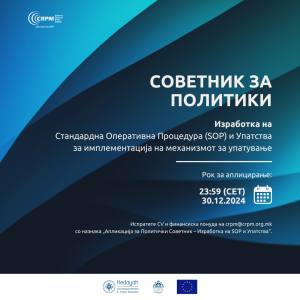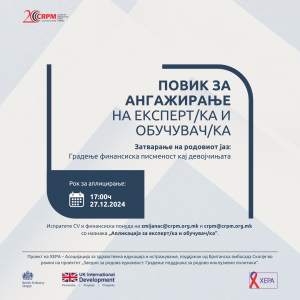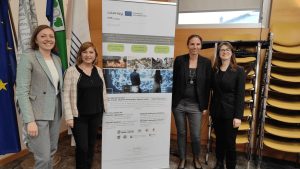INTERNAL PARTY DEMOCRACY IN MACEDONIA AND KOSOVO
Internal party democracy is about including party members in party deliberation and decision-making processes. To what extent parties in Macedonia and Kosovo follow democratic procedures is revealed in the country studies prepared by CRPM. The scale of inter party democracy in Kosovo is evaluated using the following seven dimensions. The reports are available on CRPM web site under Publications.
Funded by: KAS
SCHOOL OF PUBLIC POLICY |MOTHER THERESA|
The 2011/2012 generation of students of the School of Public Policy |Mother Theresa| continued its activities. In April we organized the session on EU enlargement and conditionality in Skopje. In June 2012 in Lazaropole, a session on Liberal multiculturalism and public policy was held. The last session for this generation was held in October, at the World Forum for Democracy organized by and held at the Council of Europe. Our students worked in Strasbourg together with participants from seventeen other similar Schools all under the patronage of the Council of Europe. In the summer of 2012 we recruited the third generation of students of the School (generation 2012/2013). Two sessions were held in the fall of 2012 on Public Policy and NATO Challenges after the Chicago Summit in 2012 both held in Ohrid. In November this year in Mavrovo, a joint session of the students of all the three generations of the School Alumni networking, public policy and gender was held.
Funded by: Council of Europe
QUALITY ASSURANCE SYSTEMS IN PRIMARY EDUCATION: WHAT WORKS IN OUR REGION?
The issue of quality education is ever so important, especially since much of ongoing education sector reforms directly or indirectly touch upon the aspect of quality. As a part of a regional project, led by the Romanian Academic Society, CRPM conducted an in-depth analysis into the Macedonian quality assurance system. Initially, the formal system setup was assessed, followed by analysis on the way it functions in practice, and especially how it addresses the so-called ‘real needs’ (8 key competences, student dropout, teacher education and training etc.). This phase of the research showed that compared to most of the other countries in the region, Macedonia has a relatively advanced QAS, although it is developed and implemented top-down and focused primarily on the students and teachers, without sufficient accountability mechanisms for other actors.
Funded by: Global development network
EVALUATION OF THE ROMA SCHOLARSHIP AND MENTORSHIP PROGRAM
The Program for providing secondary school Roma students with scholarship and mentorship support was evaluated in terms of its effectiveness, efficiency and implementation. The evaluation showed that the overall program implementation is going according to the outlined plan, with only slight modifications. The vast majority of indicators have been met, but the most critical aspect is the declining GPA of first year students, who are the most vulnerable category and most prone on losing their scholarship. A very encouraging finding was that the average GPA of the scholarship recipients is within the range of the GPA on the level of their school. The complete report is available at http://www.romaeducationfund.hu/sites/default/files/publications/ref_external_evaluation_mac052-finalmarch_21_2012_2.pdf
Funded by: Roma Education Fund
POWERFUL ADS, STRONG STEREOTYPES! EXPLORING THE LINKAGE BETWEEN THE COMMERCIALS AND NEWS CONTENT AND THE GENDER STEREOTYPES THEY CREATE IN THE SOCIETY.
How powerful the newspapers and the commercials are in creating stereotypes? This year, the challenge to answer this question was warming up our working atmosphere on daily basis during the implementation of the project “Introducing the gender sensitivity in the media in Macedonia”. The idea behind the project “Introducing the gender sensitivity in the media in Macedonia” was to provide brief assessment for the gender sensitivity of the news content in the newspapers and the TV commercials in Macedonia. This was made by a media monitoring conducted by trained students from the journalism and gender studies, applied on 5 national TV stations and 6 daily newspapers in Macedonia. In addition to this, the project increased the readiness for implementation of the concept of gender sensitivity in the Macedonian media by delivering capacity building trainings to journalists and students in the final years of the journalistic studies and empowering them with skills and knowledge about basic gender terms, gender roles and stereotypes, gender sensitive reporting etc. In the final stage of the project a study based on the monitoring data will be published altogether with a video data animation from the main findings of the media monitoring. The final policy products will be promoted at the Women’s Right’s Night’s festival in March in Skopje.
Funded by: City of Skopje
SUPPORT TO THINK TANKS IN TRANSITION TIMES
CRPM in cooperation with PASOS has provided capacity building assistance to policy centers in Egypt. As part of this project, we as PASOS member institute partner up with an Egyptian policy center, provisioned training in the field of gender equality and political participation of women and organized a study tour of Egyptian representative to Skopje, Bitola and Ohrid for them to study the system of equal opportunities in the country.
Funded by: National Endowment for Democracy
TRAIN PROGRAM
With the aim of fostering policy dialogue between think tanks and political actors in the Western Balkans, the TRAIN programme (Think Tanks Providing Research and Advice through Interaction and Networking) offers organizations from Albania, Bosnia-Herzegovina, Croatia, Kosovo, Macedonia, Montenegro and Serbia training and networking opportunities. CRPM junior researcher FrosinaIlievska and senior researchers MarijaRisteska and Ana Mickovska participated at the 2012 TRAIN programme throughout which a brief on the relation between the visa liberalization process and student mobility was prepared (available at https://crpm.org.mk/wp-content/uploads/2012/11/TheMobiliytiPaternsENG.pdf)The analysis was presented in front of officials from the DG Enlargement as well as representatives of the European Parliament in Brussels.
Funded by: DGAP
EXCHANGE OF EU BEST PRACTICES IN IMPLEMENTATION OF ANTI-DISCRIMINATION LEGISLATION
In Macedonia the citizens, CSOs, state actors have little awareness regarding discrimination. According to citizens’ perceptions the mostly recognized form of discrimination is the one of the ground of political affiliation (80%). In addition the state is believed not to take enough effort in combating discrimination. This project raised knowledge and awareness on discrimination as well as exchange experiences with other EU countries (in particular Bulgaria) through study tour, trainings on anti-discrimination legislation application; as well as provided track record on the implementation of the Law on protection from discrimination in the country in the area of employment, domestic violence, health, and education.
Funded by: European Instrument for Democracy and Human Rights
FOSTERING GOOD GOVERNANCE IN THE CITY OF SKOPJE
CRPM is very committed towards developing policies which touch upon the lives of ordinary people through working on topics which they assess as problematic during their everyday functioning. With this general goal in mind, this project aimed at improving one good governance principle in three sectors; specifically increasing participation in the childcare services (kindergartens) in the municipality of Aerodrom, improving efficiency in the Public transportation company (JSP) and improving responsiveness of the City Parking Company. The research process included: document analysis, interviews with management, surveys with service users; while the capacity building consisted of: development of TNAs, gap analyses and custom-made trainings for each company/institution.
Funded by: Swiss Development Cooperation
FROM BRAIN GAIN POLICIES TO PRACTICES
Our Center and this year was partner of the Group 484 from Serbia in the implementation of the project “From Brain Gain Policies to Practices – Dissemination of Best Institutional Practise in the WB region”. This year’s focus of the project was to propose development of institutional mechanisms for establishing Brain Gain policies in Macedonia, based on the detected positive experience from Balkans, as the Brain Gain programme from Albanie is, and another successful case studies. The projects objectives were: to identify key elements of successful institutional brain gain mechanisms and practices in the region, to strengthen governmental representatives from three WB countries for developing institutional mechanism and regional cooperation for achieving brain gain, to inform public in three countries on benefits of introducing institutional brain gain mechanism for development of the countries and the region.
Funded by: Balkan Trust for Democracy
PUBLIC DIALOGUE FOR SUSTAINABLE USE OF ENERGY IN SOUTHEAST EUROPE
The Center for Research and Policy Making supported by the GIZ office in Macedonia
Implements the project “Public dialogue for sustainable use of energy in southeast Europe” which aims to establish and maintain a public dialogue between parliament, government, business sector, media and civil society for sustainable energy use, with primary emphasis on energy efficiency. The project is implemented with the cooperation of the School for Public Policy “Mother Teresa” at the Centre for Research and Policy Making and the Open Regional Fund – Energy Efficiency in South-East Europe (EE GIZ ORF) of the German Society for International Cooperation).
Funded by: GIZ ORF
THE IMPACT OF ECONOMIC CRISES ON NATIONAL INDUSTRIAL RELATIONS SYSTEMS: POLICY RESPONSES AS KEY RECOVERY TOOLS
CRPM took part in the project “The economic crisis impact on Industrial relations national systems: Policy responses as key recovery tools” which is a 6-countries (3 member states – Poland, Estonia, Bulgaria and 3 candidate counties – Croatia, FyrMacedonia and Turkey) collective response to the current IR situation in Europe and involves research, intermediation and communication activities which target to analyze the implications of the global economic crisis on the national industrial relations (focus will be given to employees unions) systems and to introduce effective key recovery tools. It is of key importance for the project to intervene actively in the national social dialogue mechanisms, to investigate the methods of work and interaction, to present best practices in the field and to also develop policy recommendations in European and comparative terms how those industrial relations systems can be further improved and integrated into the European social dialogue.
Funded by: European Structural Funds
CRPM events
CRPM CONFERENCE: “EXPERIENCES FROM THE IMPLEMENTATION OF THE BOLOGNA PROCESS”
The conference aimed to reflect on the experiences from the implementation of the Bologna Declaration in the Macedonian higher education system through welcoming renowned bologna experts from Macedonia and abroad. Speakers included the Macedonian Bologna promoters, as well as a representative of the Danish Agency for Universities and Internalization and a representative of the Ljubljana University (Faculty of Social Sciences). Based on the presentations and discussions, CRPM developed a policy document with recommendations to the Ministry and Universities for future more successful adaptation and implementation of the Bologna process.
PUBLIC DEBATE: “PUBLIC DIALOGUE FOR OVERCOMING OF PROBLEMS IN THE IMPLEMENTATION OF THE LEGISLATIVE FRAMEWORK ON ENERGY EFFICIENCY”.
On February 21, 2012 at the Skopje Fair MBC Diplomatic Hall, CRPM, supported by GIZ ORF EE, organized public debate: “Public dialogue for overcoming of problems in the implementation of the legislative framework on energy efficiency”. The aim of the meeting was to encourage a discussion to improve the legal system in the area of energy efficiency, with particular focus to identify existing problems in the implementation of the legal framework as well as to define topics for further discussion and reform.
CRPM CONFERENCE: “ACHIEVING SOCIAL AND ECONOMIC SUSTAINABILITY THROUGH ENERGY EFFICIENCY ON CENTRAL AND LOCAL LEVEL”
The conference was part of the project “Public dialogue initiative for the sustainable use of energy efficiency” organized by the Centre for Research and Policy Making (CRPM) and was supported by the Open Regional Fund for Energy Efficiency (EE GIZ ORF) of the German Society for International Cooperation .
The conference was comprised of two panels:
- Energy efficient local communities and
- Energy poverty
On these panels presenters were: Carlo Rajic official representative of REAGEA; Zoran Bogunovic representative of UNDP Croatia; LjupcoDimov representative of Karpos municipality; Mr. StrahilPanev representative GIZ office; IlijaSazdovski representative of UNDP; Robert Sharlamanov representative of KfW Skopje, Aleksandar Kovacevic-independent consultant, Stefan Buzarovski from the University of Birmingham and Zoran Bogunovic, Independent Consultant. The conference was opened by the Minister of Economy ValonSarachini, and HE the Ambassador of Germany in Macedonia Ms. Gudrun Steinacker.
CRPM CONFERENCE: “STATUS OF WOMEN IN RURAL AREAS IN REPUBLIC OF MACEDONIA”
Status of women in rural areas of the Republic of Macedonia was main focus of the conference held on 22 May 2012 in Skopje, organized jointly by the United Nations Entity for Gender Equality and the Empowerment of Women (UN Women) and Center for Research and Policy Making (CRPM). It was an opportunity to discuss conclusions and recommendations from recently concluded study summarized in a new publication “Perspectives of women in rural areas – Policy brief”. The study is a result of representative field research and assessment of policy frameworks in place carried out by the CRPM with technical and financial support from UN Women. The complete report is available at the following link http://www.unifem.sk/index.cfm?Module=articles&Page=ArticleShow&ArticleID=201
CRPM CONFERENCE: OPEN GOVERNMENT DEEPER DEMOCRACY
The Center for Research and Policy Making has organized the conference “Open Government, Deeper Democracy” in association with the annual international think-tanks’ conference of PASOS – Policy Association for an Open Society. The Conference was held on 9-10 November 2012 at Hotel Continental, Skopje.
On this Conference, leading think-tanks co-operated in order to explain and influence national and international policies, including EU policies, on a range of issues facing the Western Balkans and other transition regions, while building on EU new member-states’ experience of democratic transition and EU integration to debate transition know-how with think-tanks from EU’s neighboring regions.
The Conference themes were the following:
- Forging a New Impetus towards Open Government
- Mobility and Integration of Migrants through Participatory Policymaking
- Reform of Regional Co-operation Structures with an Enhanced Role for Non-State Actors
- Prospects for European Integration and Regional Integration
Speakers of the Conference at the opening were Ms. MarijaRisteska, Executive Director of the Center for Research and Policy Making and the Resident representative of Friedrich Ebert Stiftung in Skopje, Dr. Heinz Bongartz. Key note speaker was the Minister for Foreign Affairs of Republic of Macedonia, Mr. Nikola Poposki, moderated by Ms. Agnieszka Lada. During the first day Mr. Jeff Lovit presented the awards in recognition of think-tank achievements in 2011/2012.






Leave a Reply